The Latitude Festival-goers stockpiling to save money
- Published
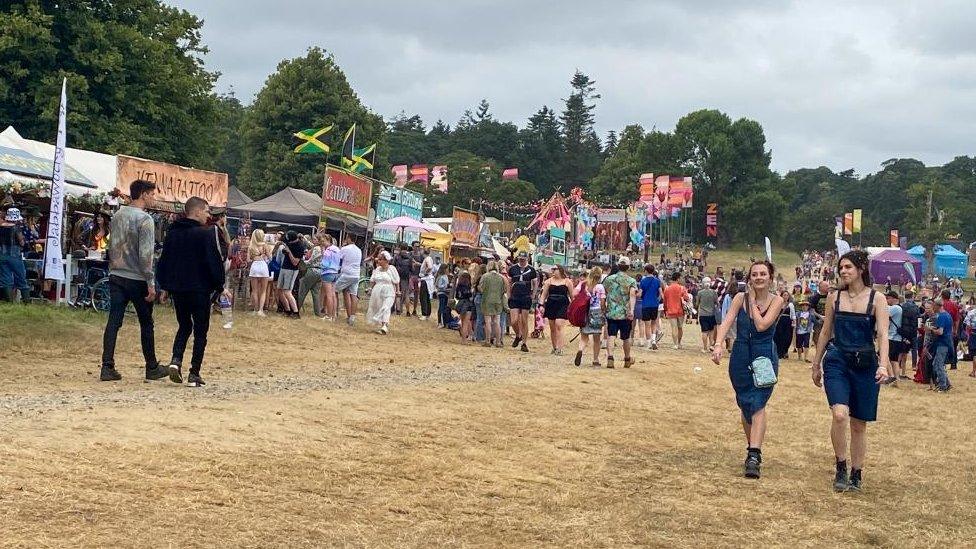
Up to 40,000 people are expected to be at Latitude each day, where dozens of food and drink stalls compete for their custom
With about 40,000 expected each day, the annual Latitude festival is in full swing in Suffolk. What does the rising cost of living mean for festival-goers and has it altered their plans?
First held in 2006, Latitude has become a mainstay of the festival calendar.
Cancelled in 2020 amid the Covid-19 pandemic, the festival, held at Henham Park near Southwold, went ahead last year as part of the government's live event pilot scheme.
Latitude's founder and creator Melvin Benn says ticket prices this year rose 11% because costs have gone up 30% to 40%.
"Costs are out of control in all aspects of life," he says. "It is challenging."
While attendance remains as strong as ever, festival-goers, and the traders hoping for brisk business, say rising prices are having an impact.

'Save a bit of money'
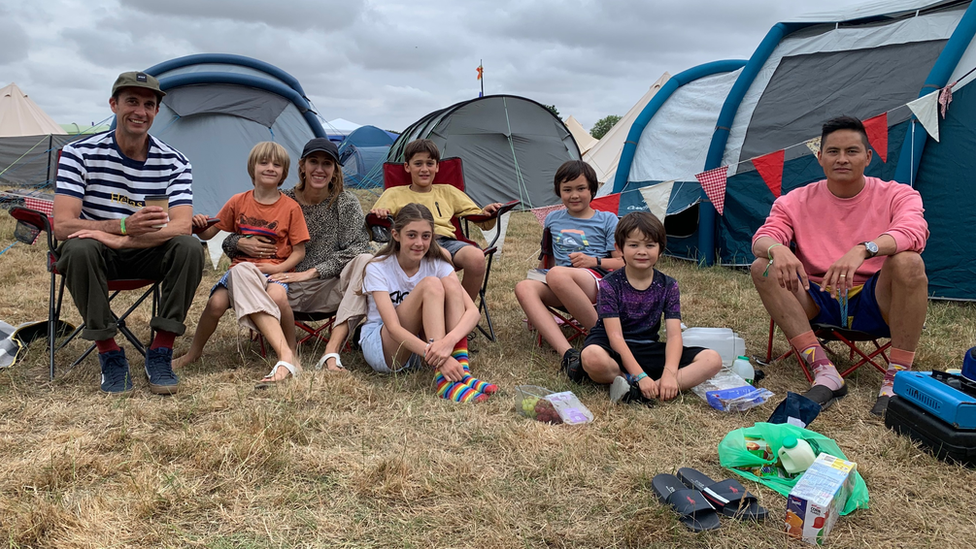
Philippa Barr (third from left) says her family's decision to stay on site in tents this year was made to save money
Philippa Barr and partner Adrian Kerr have been to Latitude five times in the past eight years and they usually rent somewhere off site to stay in.
This year, they are doing things differently and staying on site in tents with their three children and friends, and a cool box full of supplies.
Philippa, 44, a theatre producer from London, says: "We did consider the cost of living and the impact that is having on us and everyone else.
"We decided this year that we would save a bit of money by tenting and not travelling in and out and paying babysitters.
"That was one factor that we thought would bring the cost down because otherwise we would be looking at another £500.
"The tickets for us all are just below £600, so it is already quite a big commitment to be here.
"But we treat it as a holiday - we are here for a long weekend, and we get to see so much music and the value of that is just brilliant."

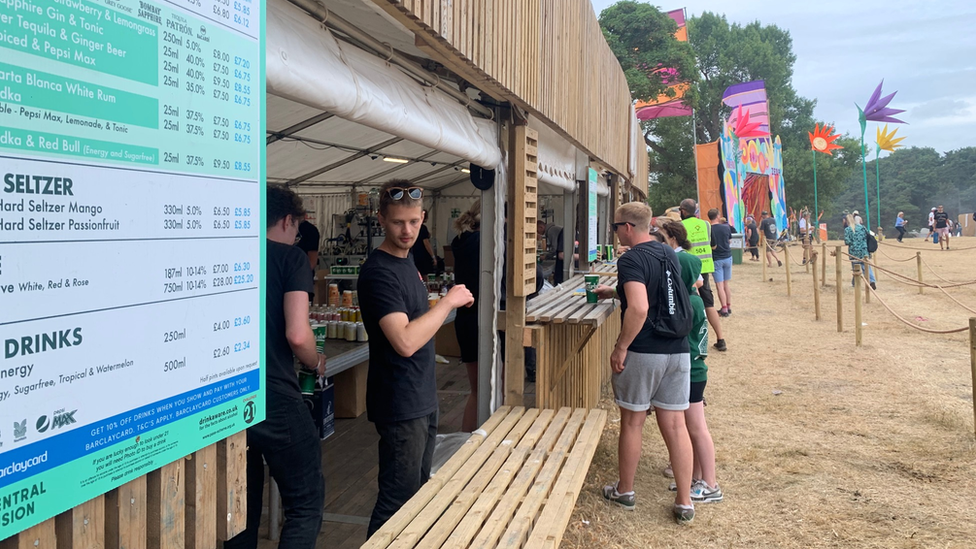
There were no problems getting served at this festival bar on Friday afternoon, although the grass looks parched
Latitude and costs
£254.05 for an adult weekend ticket for Latitude
£175.40 for a weekend teen ticket (£15 for a pre-teen child)
£6.50 for a pint of lager
£2.60 for 500ml bottle of water (though free drinking water is also available)
£4 for French fries
£10 for sausage, mash and onion gravy
£7.50 for strawberry and cinnamon pancake

'It is really expensive at festivals'
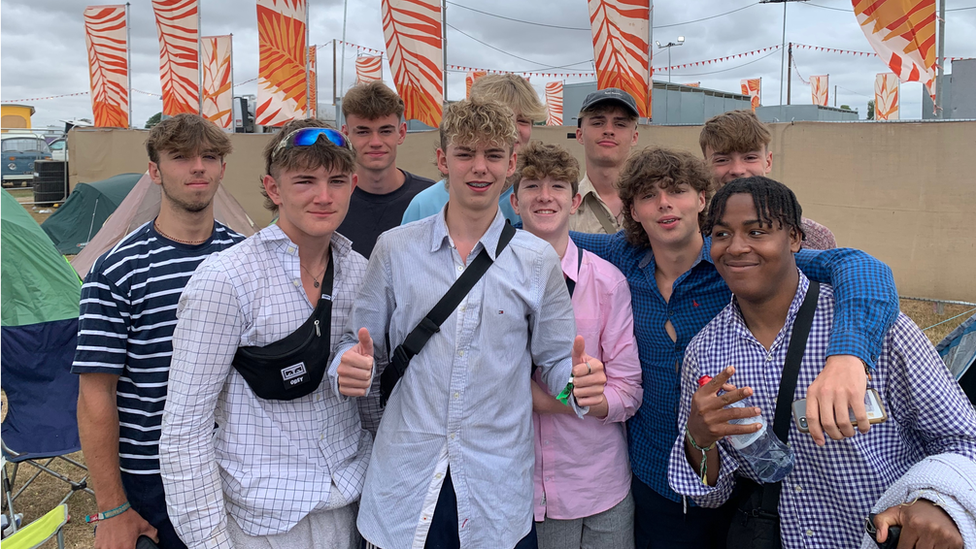
Joseph Miller (centre) says he tries to bring as much food as he can with him to cut down eating costs
Joseph Miller, 18, has come from Norwich and hopes to spend no more than £50 on extras.
"I made sure to bring a lot of other food that can fill me up because it is really expensive at festivals," he says.
"Prices are really high, so I just made sure to bring the essentials with me and then I'm going to be saving some money each day to buy food at the festival.
"It is super expensive - it was like £10 for some chicken and chips."
He says he and his friends have brought their own alcoholic drinks, because they would struggle to afford them at the festival's bars.
However, while punters can bring their own cans, they are only allowed to consume them in the festival campsites and not in the arenas, external.
"So we will drink our drinks and then go into the festival," he says.

'It is not a cheap weekend'
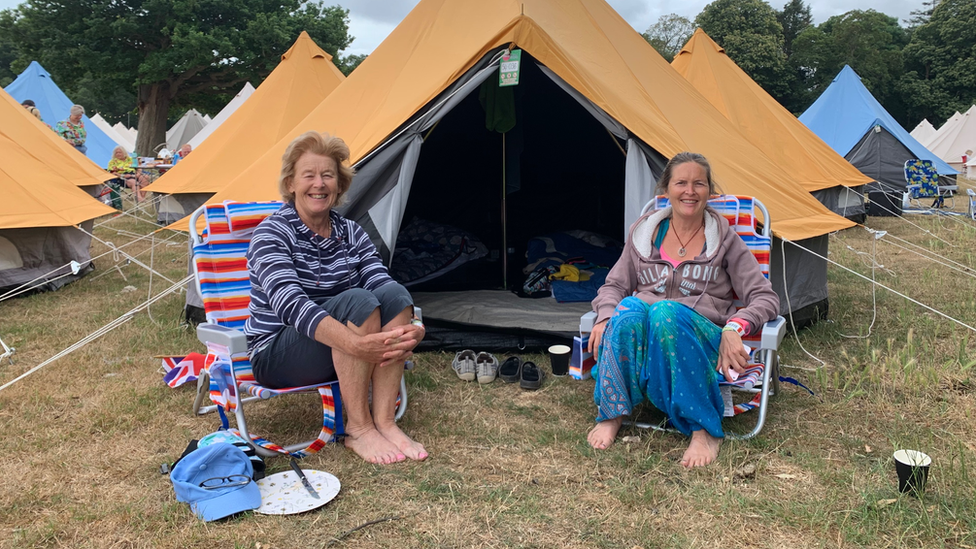
Mother and daughter Angela and Lorna Fossick are first-timers at the music, comedy, theatre, poetry, film and literary festival
Mother and daughter Angela Fossick, 74, and Lorna Fossick, 48, are first-timers at the festival and decided to go to celebrate their shared birthdays.
The pair, from Halstead in Essex, are looking forward to the weekend ahead.
Angela says: "We're not real campers so we didn't bring a tent to put up so I got the best [pre-erected] tent that I could get for the two of us.
"It was about £500. There are bigger and more expensive ones. And it was about another £500 to get in to the festival. It is not a cheap weekend.
"We brought lots of snacks and a few rolls and fruit and a water bottle each. We are all set really."

'If we're lucky, we'll break even'
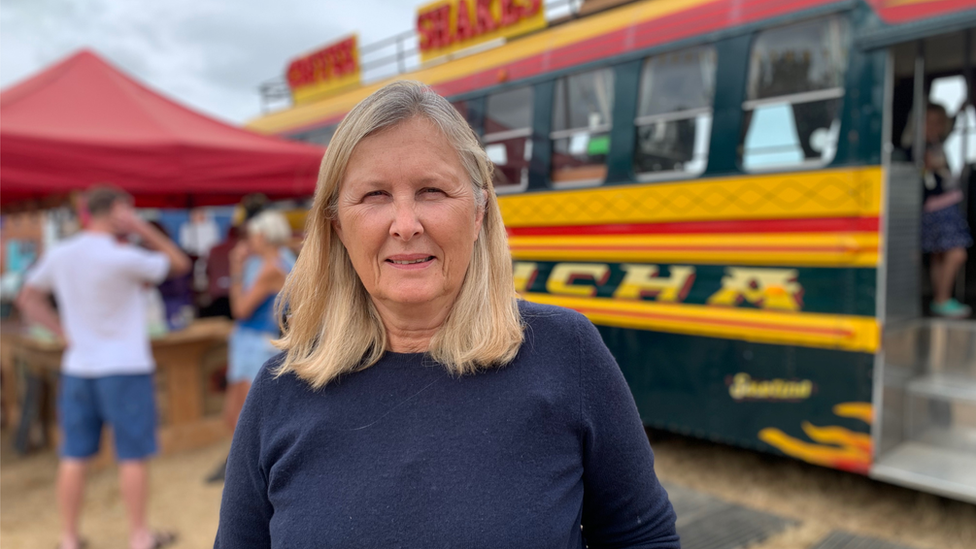
Trader Gabi Naish, 64, has come from Poole in Dorset and runs a speciality coffee bus
Trader Gabi Naish, 64, has come from Poole in Dorset and runs a speciality coffee bus.
"The cost of living has really impacted on us because the cost of our raw ingredients have gone up a third," she says.
"We make award-winning brownies but the cost of butter has gone up - what used to cost £1.25 now costs £2.50.
"We use chocolate and really good coffee from South America and the import costs of that have really gone up.
"We can't increase our prices by a third so we are absorbing most of that. It is really terrible. We want to keep coming to events because it is our livelihood.
"If we're lucky, we'll break even."

'We will unfortunately see fewer bands'

Kim Jarvis, Gaffa Tape Sandy, says the rising cost of living makes keeping a band afloat much harder
Kim Jarvis is the singer and guitarist with Gaffa Tape Sandy. From Bury St Edmunds in Suffolk, they are appearing on the BBC Sounds stage.
The 26-year-old says he fears bands who also have to work day jobs might not be able to afford to make music if costs continue to rise.
"All the money we make from the band from gigging, from touring or whatever we're doing, goes back into the pot. At the moment, that pot is remaining the same size thankfully," he says.
"We all have jobs outside [the band] and it means we are needing to work more. It is difficult because it means the time we take for gigging or on tour we are not at work for.
"We are having to really balance work and the band even more because the bills are rising.
"I think as living costs continue to rise, we will unfortunately see fewer bands and fewer people starting bands because they will have to be at work all of the time."

Find BBC News: East of England on Facebook, external, Instagram, external and Twitter, external. If you have a story suggestion email eastofenglandnews@bbc.co.uk, external
Related topics
- Published23 July 2022

- Published22 July 2022

- Published16 July 2022

- Published14 June 2022
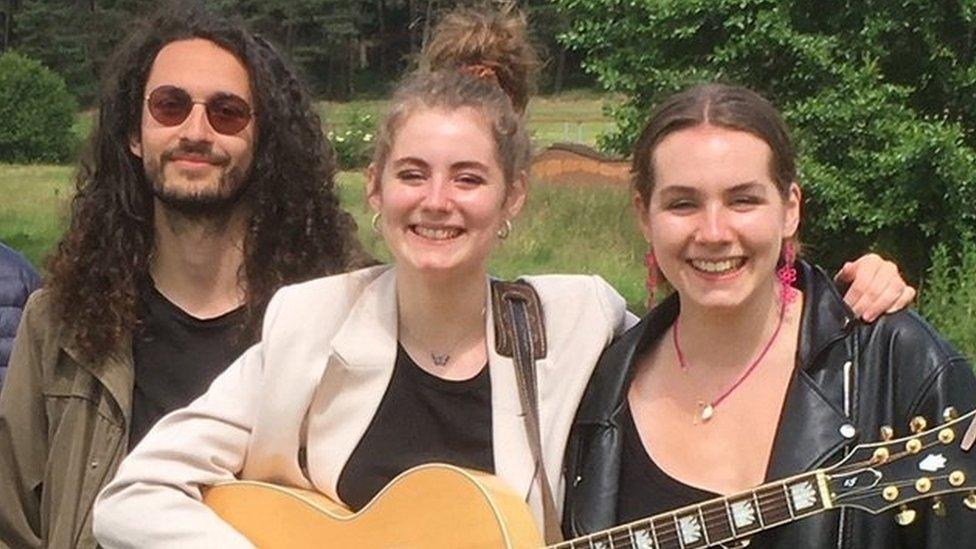
- Published23 July 2021
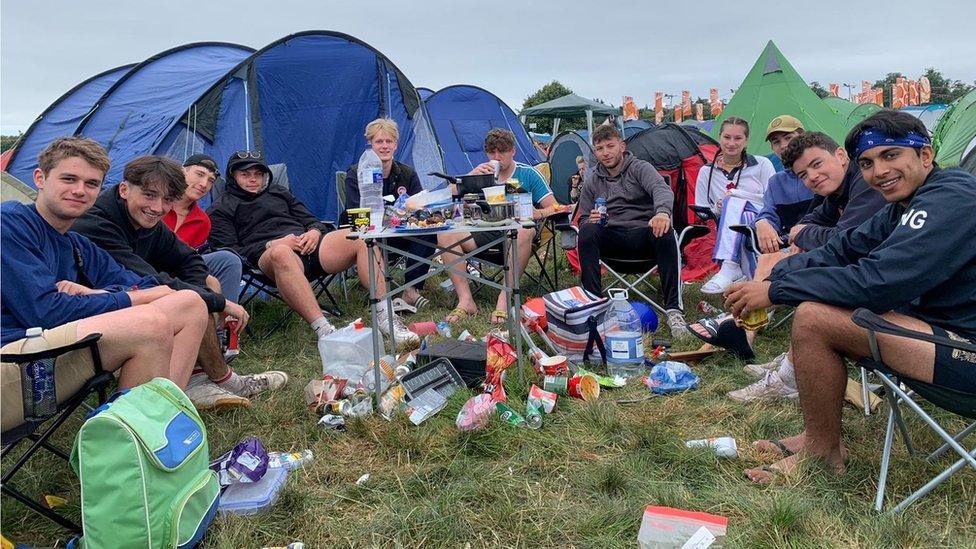
- Published21 July 2021
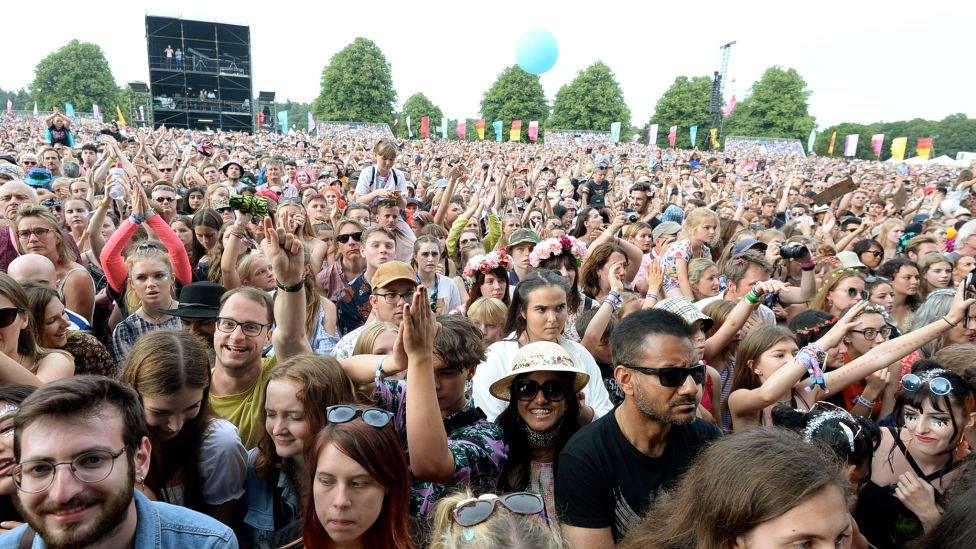
- Published19 July 2015
